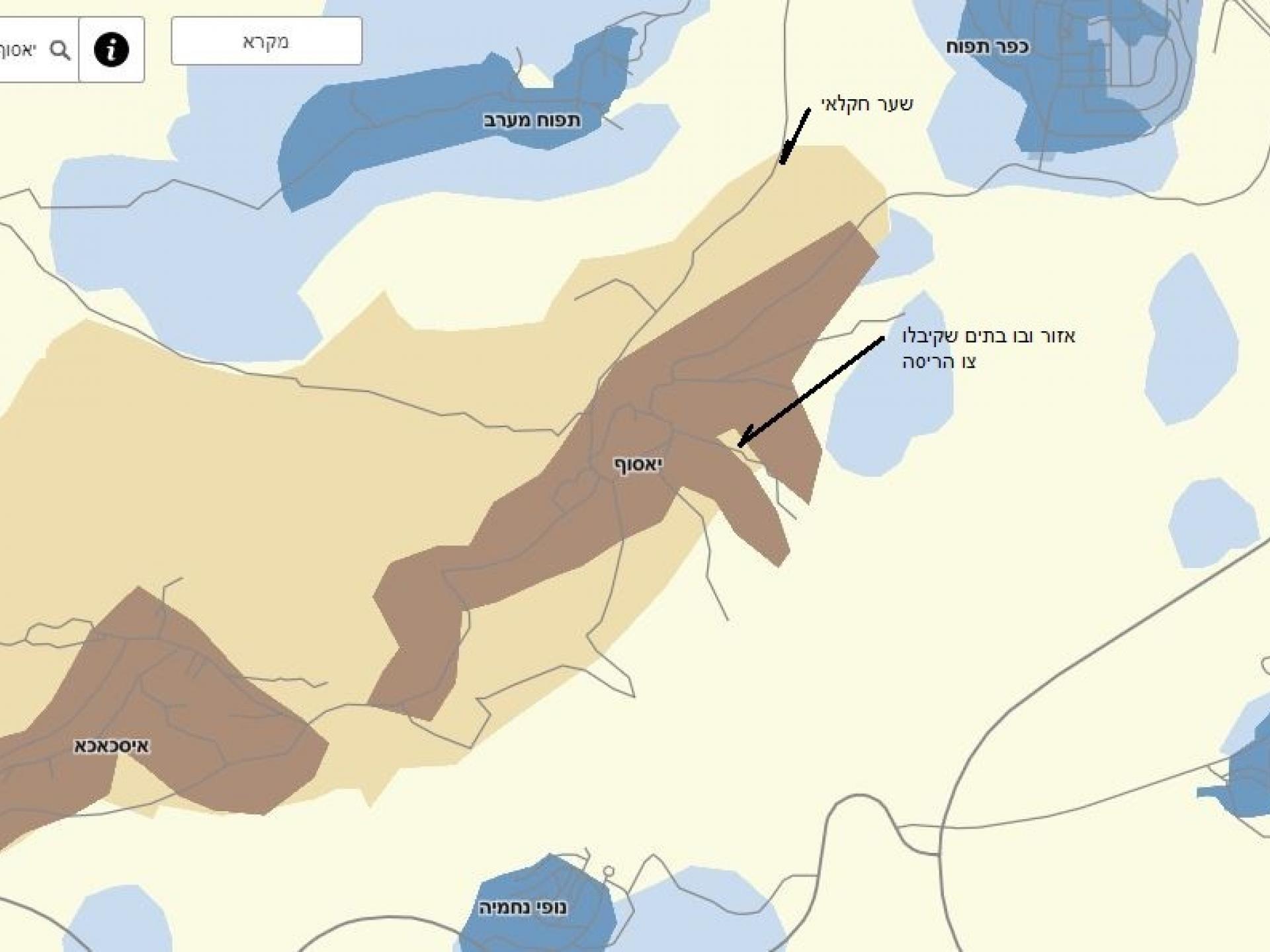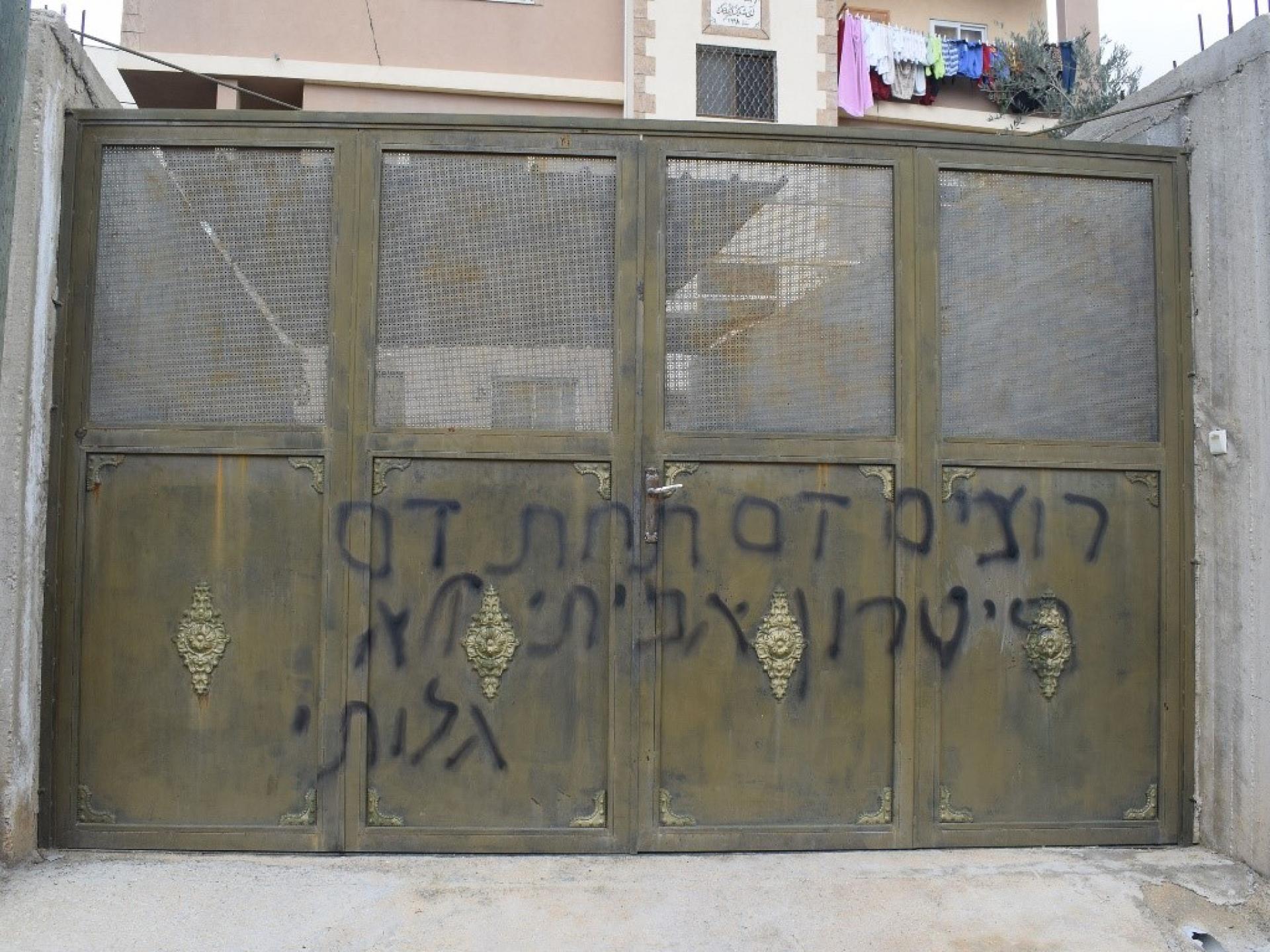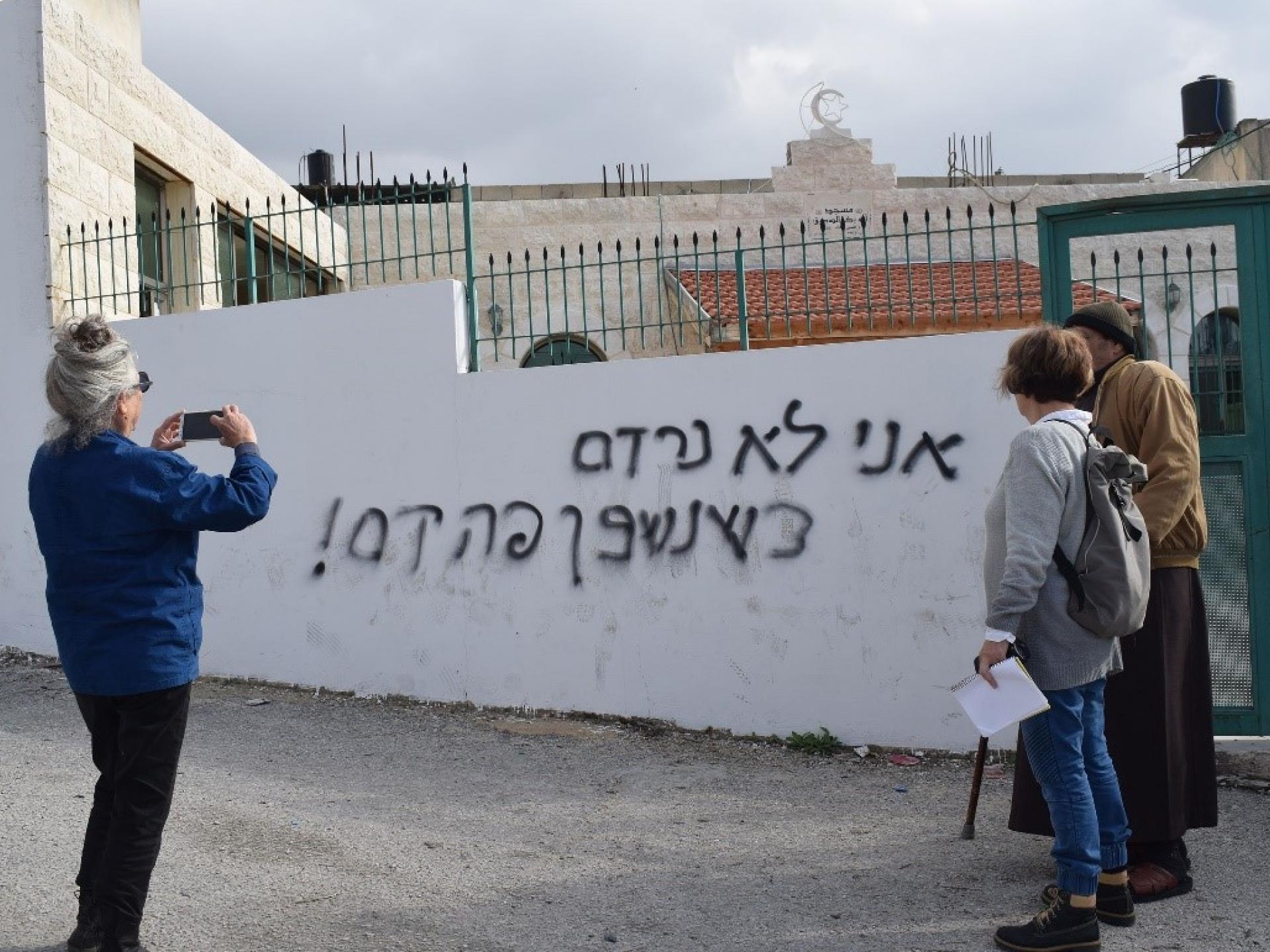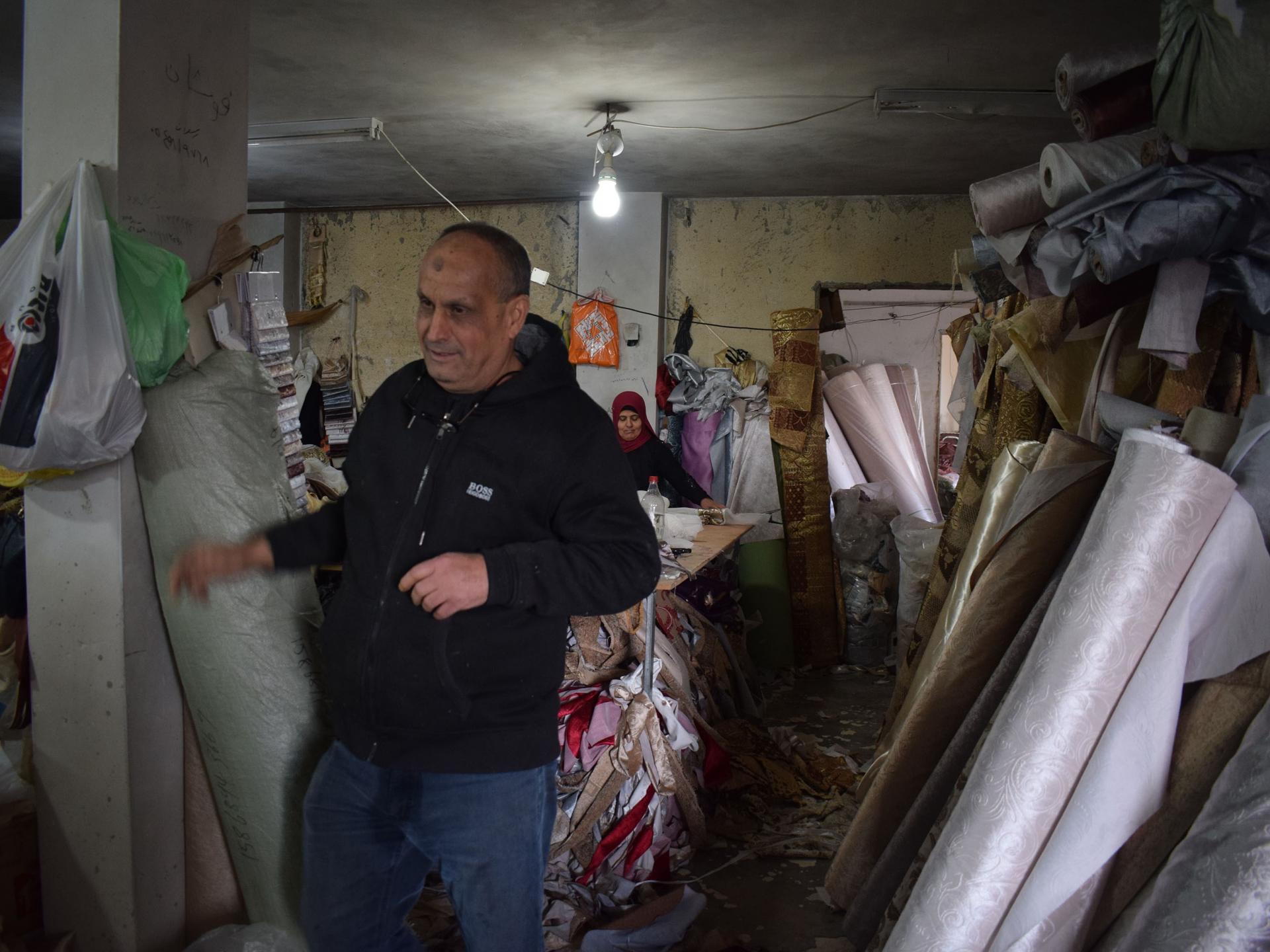We want blood for blood – the hate slogan sprayed by settler-colonists

Yassouf village – a show of presence by Jewish settler-colonists, hate slogans sprayed in the midst of the village
We arrived for a planned meeting at Yassouf with M., the local council secretary, and H. who is a nominee for village council head elections six months from now. A day earlier he called and reported settler-colonist harassment at night, asking us to come and photograph, as well as bring maps of the Ariel settler-colony and its surroundings. At a visit we held a week earlier (see our report of December 12, 2018) we went out with him to see nearby sites and didn’t return to the village council house to examine the maps together because we thought the army was hurrying to the village to “catch us” after seeing us in the ravine next to the checkpoint, and wanted to avoid confrontation with it. This is an agricultural checkpoint built about 7 years ago on a dirt track exiting the village to road 505, very close to the Tapuach-West settler-colonist outpost. In spite of the checkpoint’s purpose, owners of the olive tree groves are allowed through only twice a year, at the harvest and the plowing seasons. Even approaching it from the village proves dangerous! Electronic “eyes” observe the track and warn of any movement. The army vehicles that hurried towards the village when we turned around and left continued to drive through the village for another 2 hours after our departure.
The maps we brought this time were taken from Google, B’Tselem website, and Amud Anan. The latter map lacks the names of the villages of Yassouf and Iskaka as reported in our last report, whereas the names of Jewish settler-colonies and outposts (including Tapuach West and Nofei Nehemya) are marked on the map, as well as the terrain surrounding Maqam Abu Zard which is lovely and well maintained, surrounded by ancient trees and mentioned on the map as “Alonei Tapuach” (Heb. for oaks of Tapuach) – a name attesting to the intention of annexing the marked area to the Tapuach settler-colony. In fact, the maqam is situated between the Palestinian villages of Yassouf and Iskaka inside Area B, but the settler-colonists’ eyes are fixed upon the hill with its ancient trees and archeological findings of the Roman and Islamic periods as well as the springs and lovely spots nearby.
Together we also reviewed the B’Tselem map that emphasizes Areas B and C.
H. pointed to an area that has been designated for annexation to the Area C definition. We were told it contains 24 homes, all of which are now under demolition orders.
While we were pondering the maps, more councilmen arrived. One of them, appearing very religious, tried to challenge the authenticity of our activity, since both we and our children have served in the Israeli army.
The night before we arrived, a very rainy one, about half an hour past midnight, Jewish settler-colonists came to Yassouf, punctured the tires of 12 vehicles and sprayed hate texts on the mosque wall and the gate of a home. Meanwhile the cars have been moved to repairs but the hate messages are still there. The report by Miki and Fathya of December 18, 2018 (a day before we came) documents this.
A-Sawiyah – Palestinian farmers’ olive trees cut down by settler-colonists.
Their owner is prevented from approaching his land
At the Yassouf council house we were told that olive trees were cut down this week in the groves belonging to A-Sawiyah farmers. The settler-colonists are allegedly uprooting the trees and planting their own. When we heard this, we decided to go there and gather additional information. At the village we met the fellow whose trees were cut. The grove is small, containing 40 trees. As he told us, settler-colonists have already cut his trees three times this year. Up till now “only” 20. The area is very close to the Rechelim settler-colony. He has no permit to get there on his own. The last time he was there, was about a month ago at olive harvest time, and it was on Facebook that he was informed of the destruction. Following this he went out to see for himself but could only observe from a distance and had no ability to photograph it. See the clip in which he describes the settler-colonists’ deeds in his grove.
We went out to look for the cut trees. On our way, from a distance we saw plastic sheets and blue barrels, usually serving as protection of new saplings. We avoided entering the settler-colony surrounded by fences, and thus did not find the cut trees.
During our searches we reached an isolated house in Yatma village. The owner had not heard of this event but suggested we climb up to the roof and see the olive groves that lie between his house and the settler-colony. To the roof we were joined by the women of the family: the owner’s wife and two younger women, sisters married to two brothers. The women told us that one of their husbands was killed at a road accident, and the other was hurt in a work-related accident inside Israel about three months later. He fell into an elevator peer. After this accident they received a month’s pay but no compensation. The husband, his head wounded, was hospitalized in Israel, is not functioning following his injury and remains in his room all day. We shall inform Kav La’Oved (Heb. for ‘hotline for workers’) of this case.
From the roof we saw a house nearby that belongs to one of the sisters. The army, that until five years ago regularly entered and searched both the house we were in and the nearby one, has refrained from doing so after the husband was killed, but warned them unequivocally that if stones were thrown from there or if they were to hide suspects, the house would be demolished.
Our meeting with the women left a harsh impression. An unplanned visit and chance meeting has made it obvious that every single house holds a difficult story related to the Israeli military occupation and its doings.
A positive point: the house owner has an active sewing workshop. Several seamstresses have worked there for 20 years, laboring by the sewing machines. Rolls of fabric from China lean on the wall. With the help of an Israeli partner, their products are sold in Israel.
Marda village
A meeting there had been scheduled. The council worker was not present but the secretary was there, surprised at our arrival. Smiling, she asked us whether we saw any results to our activity. The meeting had been planned in order to find out if people in the village remember maqam Ahmad Al Qasab, destroyed when the fence around Ariel settler-colony was erected. On the maps it is noted. At the council house we met a villager who knows the owner of the lands around the fence.



